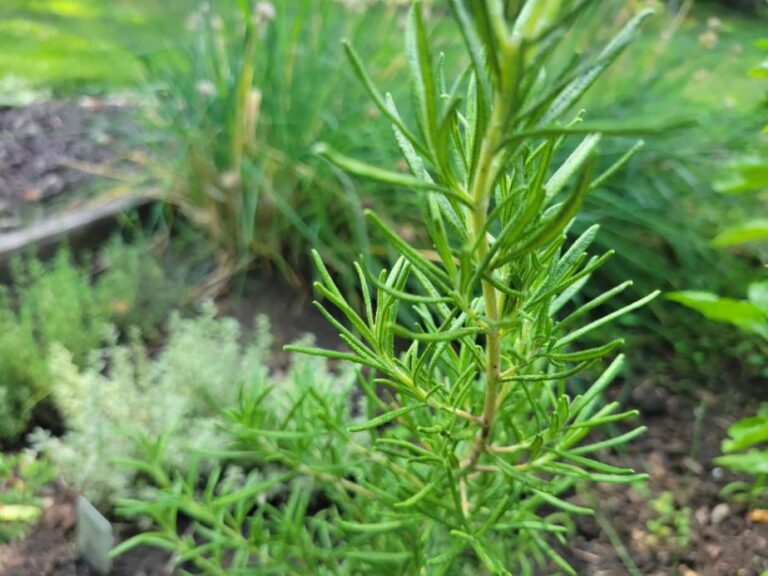This post may contain affiliate links which means I may receive a commission for purchases made through links. I only recommend products that I have personally used. As an Amazon Associate I earn from qualifying purchases. Learn more on my Private Policy page.

Rosemary is a great garden companion to vegetables like beans, carrots, and members of the brassica family such as cabbage, broccoli, and kale. Rosemary also grows well alongside other drought-tolerant herbs such as thyme, oregano, sage, and lavender.
For an in-depth exploration of this aromatic herb, see my Complete Guide to Rosemary.
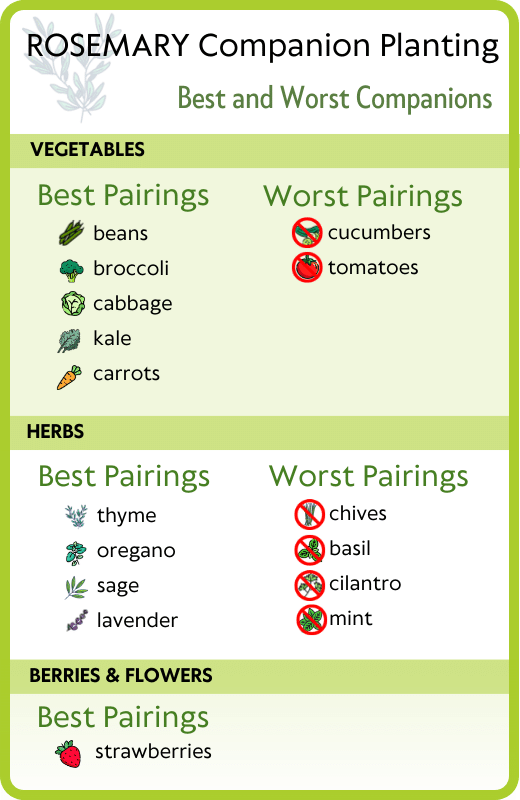
Table of Contents
Best Herb Companions to Rosemary
By strategically selecting herb garden companions for your rosemary, you can create a harmonious ecosystem that benefits all plants involved. Let’s explore some popular herbs that make great companions for rosemary
What herbs can you plant next to rosemary?
Sage, thyme, oregano, and lavender are all great herb garden companions to rosemary, as they have similar growing requirements. These herbs all thrive in full sun and well-drained soil that should dry out between waterings.
Sage and Rosemary

Sage and rosemary not only complement each other in terms of flavor but also provide mutual benefits when grown together. Both sage and rosemary thrive in similar growing conditions, requiring full sun and well-drained soil.
Purchase sage plants from Amazon or sage seeds from SeedsNow
Sage attracts beneficial insects like bees and butterflies, which play a crucial role in pollination. In addition, sage and rosemary both contain volatile oils that can discourage insects such as mosquitoes, cabbage moths, and carrot flies. When companion planting sage with rosemary, they form a natural barrier against pests.
Thyme and Rosemary

Thyme is an excellent companion for rosemary due to its ability to repel harmful insects while attracting beneficial ones. Together these two herbs can help protect nearby garden plants from common pests like aphids or spider mites. Moreover, thyme’s compact growth habit complements the upright nature of rosemary plants, creating an aesthetically pleasing arrangement.
Purchase thyme plants from Amazon or thyme seeds from SeedsNow
Thyme and rosemary both prefer similar growing conditions: lots of sunlight and well-drained soil with average moisture levels, and they are both fairly drought tolerant. This compatibility makes thyme an ideal companion plant in your herb garden.
Oregano and Rosemary

Oregano is known for its robust flavor profile and culinary versatility. When planted alongside rosemary, oregano acts as a natural ground cover, suppressing weed growth and reducing soil erosion. This not only benefits the oregano but also helps protect the shallow root system of rosemary from competition.
Purchase oregano plants from Amazon or oregano seeds from SeedsNow
Furthermore, both rosemary and oregano are drought-tolerant herbs that prefer similar growing conditions. Their shared love for sunlight and well-drained soil makes them great companions in the herb garden. With oregano companion planting, this pairing can create a vibrant tapestry of fragrant foliage that adds depth and texture to your herb garden.
Growing Lavender with Rosemary

Lavender and rosemary both thrive in full sun and well-drained soil, making rosemary a great lavender companion plant in the garden.
When grown together, rosemary and lavender attract pollinators like bees and butterflies while repelling pests such as mosquitoes or moths. The combination of these two herbs creates an enticing environment for beneficial insects while deterring harmful ones.
Purchase lavender plants from Amazon or lavender seeds from SeedsNow
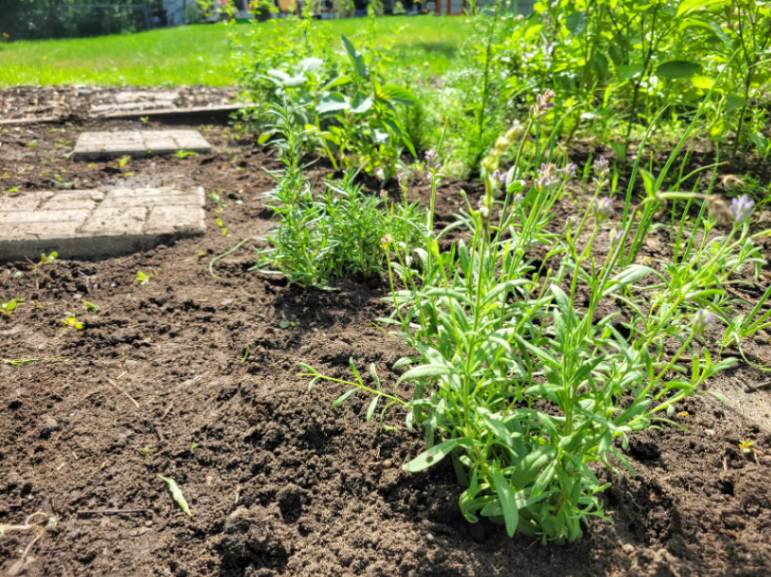
Brassica Compatibility with Rosemary

Brassicas such as broccoli, cabbage, and kale make good companion plants with rosemary due to their mutual benefits and ability to boost pest resistance. The combination of these two plant families can create a harmonious environment, benefiting both plants and gardeners alike.
Purchase cabbage seed varieties from SeedsNow
Boosting pest resistance by pairing brassicas with rosemary

One of the key benefits of companion planting is its ability to improve pest resistance within the garden ecosystem. This is particularly important for members of the brassica family, as they are susceptible to numerous pests that can decimate crops if left unchecked.
Purchase broccoli seed varieties from SeedsNow
Rosemary is known for its aromatic fragrance and strong scent, which can help deter pests that commonly afflict brassicas. You can naturally repel insects such as aphids, cabbage worms, and whiteflies by planting rosemary alongside your cabbage, broccoli, and other brassica crops.

By interplanting rosemary with kale, cabbage, and broccoli, you create a natural barrier against common pests. The strong aroma emitted by the rosemary acts as a repellent for many insects while attracting beneficial predators like ladybugs and hoverflies that feed on harmful pests.
Purchase kale plants from Amazon or kale seed varieties from SeedsNow
Furthermore, certain compounds present in rosemary have been shown to inhibit fungal growth. This can be beneficial for protecting your brassica plants from diseases such as clubroot or powdery mildew that often affects these vegetables.
Strawberries and Rosemary

Strawberries are another great companion to plant alongside rosemary. One advantage is that it helps to control pests and weeds in the garden.
Purchase strawberry plants from Amazon
Rosemary as a Pest Deterrent
One of the significant advantages of growing strawberries with rosemary is that it helps deter pests that commonly affect strawberries. Rosemary has a strong scent that repels many insects, including aphids and spider mites. These pests can cause damage to strawberry plants, affecting their growth and fruit production.
Using Strawberries for Weed Control
Strawberries tend to grow low to the ground and can act as a living mulch to prevent weeds. By planting strawberries alongside the more upright rosemary, you can use them as a natural barrier against persistent weeds.
Rosemary Attracts Beneficial Insects
Rosemary’s strong scent not only repels harmful pests but also attracts beneficial insects like lacewings and hoverflies. These insects are natural predators of aphids and other common strawberry pests and help to keep these pest populations under control without resorting to chemical pesticides.
Carrots and Rosemary

Growing rosemary alongside your carrots can have a positive impact on the garden. Not only do these two plants complement each other aesthetically, but they also provide several benefits when planted together.
Purchase carrot variety seeds from SeedsNow
Natural Pest Control for Carrot Crops
The strong scent of rosemary acts as a deterrent for many insects that commonly plague carrots. Rosemary emits an aroma that repels carrot flies, which can cause significant damage to the roots.
Another advantage of growing carrots with rosemary is that it attracts beneficial insects like ladybugs and lacewings. These insects feed on harmful pests such as aphids and caterpillars that may attack your carrot plants.
Root Rot Prevention
Carrots are vulnerable to root rot caused by certain soil-borne pathogens. Planting rosemary next to your carrots can help mitigate this issue, as rosemary has antimicrobial properties that inhibit the growth of pathogens responsible for root rot.
To maximize these benefits and minimize the risk of root rot, use well-draining soil rich in organic matter to promote healthy root development in carrots. Water them adequately but avoid overwatering or allowing standing water near their roots.
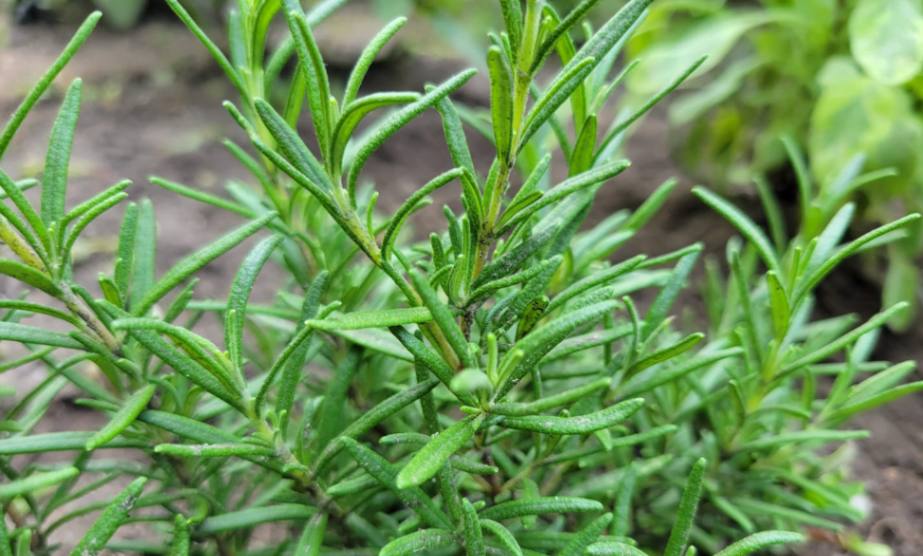
Carrots and Rosemary Growing Conditions
Both carrots and rosemary prefer a sunny location with well-draining soil. Carrots prefer fairly consistently moist soil but do not do well if waterlogged. Rosemary, on the other hand, should be watered deeply but less frequently and prefers the soil to dry out between waterings. Due to varying water requirements, some gardeners use potted rosemary as a garden companion to carrots versus planting directly into the soil near carrots.
By following these care guidelines on carrots and rosemary companion planting, you can create a harmonious garden where your carrots will be protected from pests and root rot.
Beans and Rosemary

Beans are a good companion to rosemary. From nitrogen fixation to pest control, this companion planting duo enhances your garden’s overall health and productivity.
Purchase bean seed varieties from SeedsNow
Nitrogen Fixation Benefits of Beans
One of the key advantages of pairing beans with rosemary is their ability to promote nitrogen fixation. Beans are known as nitrogen-fixing plants, which means they have the unique capability to convert atmospheric nitrogen into a form that other plants can readily absorb. This process enriches the soil with essential nutrients, benefiting neighboring plants like rosemary.
Rosemary thrives in nutrient-rich soil and benefits from the increased nitrogen levels provided by growing beans alongside them. This symbiotic relationship ensures that both plants receive an adequate supply of nutrients, resulting in healthier growth and improved yields.
Pest Control Support with Beans and Rosemary
Another reason why beans and rosemary pair so well together is their mutual pest control properties. Rosemary is renowned for its strong aroma, which acts as a natural deterrent against pests like aphids, bean beetles, and spider mites. Planting potted rosemary or rosemary plants near your bean crop helps to ward off these unwanted visitors.
Companion Planting Tips
When incorporating beans and rosemary into your vegetable garden:
- Interplant wisely: Position your rosemary plants or containers strategically throughout your garden beds near bean patches.
- Rotate crops: To maintain soil health and prevent disease buildup, rotate your bean and rosemary plants annually.
- Include marigolds: Marigolds are an excellent companion for both beans and rosemary. Their vibrant flowers attract pollinators while repelling pests.
What Not to Plant with Rosemary
Knowing which vegetables and herbs do not grow well with rosemary is equally important when planning your garden layout.
Tomatoes and cucumbers make poor companion plants to rosemary due to their higher watering needs. Rosemary is a drought-tolerant herb that thrives in drier conditions. Also avoid planting moisture-loving herbs like basil, mint, cilantro, and chives near rosemary to maintain your garden health.
Vegetables Not to Plant with Rosemary
Avoid planting rosemary near tomatoes and cucumbers due to their different moisture needs. Rosemary prefers drier conditions, while tomatoes and cucumbers thrive with consistent moisture.
Tomatoes and Rosemary

Tomatoes make a poor companion for rosemary. While they both make excellent additions to any herb or vegetable garden, their watering needs differ significantly. Tomatoes thrive in moist soil conditions, requiring regular watering to support fruit production. Conversely, Rosemary prefers drier soil and can suffer from root rot if exposed to excessive moisture.
Cucumbers and Rosemary

Cucumbers are notorious for being heavy drinkers. They require consistent moisture levels throughout their growing season to produce fruit. Cucumber’s high demand for water conflicts with the drought-tolerant nature of rosemary.
Moreover, cucumbers tend to sprawl across the ground as they grow, potentially overshadowing the sun-loving rosemary plant nearby. The reduced sunlight exposure may hinder the growth and overall health of the rosemary.
Herbs Not to Plant with Rosemary
Moisture-loving herbs such as mint, basil, cilantro, and chives should not be planted near rosemary due to their disparate water requirements.
Mint and Rosemary

Rosemary and mint are not great companion plants as they have very different growth habits and requirements. Rosemary thrives in well-drained soil and prefers drier conditions, whereas mint enjoys moist soil. This difference in water preferences can create an imbalance when planted together.
Mint has a tendency to spread rapidly through underground runners, which can quickly overtake the surrounding area. This aggressive growth habit can crowd out rosemary and inhibit its development. It is recommended to plant these two herbs separately or companion plant mint in isolated containers to prevent this from happening.
Basil and Rosemary

While basil and rosemary are often used together in various culinary dishes, they have distinct growing conditions that make them incompatible as companion plants. Basil prefers consistently moist soil and requires regular watering to flourish. In contrast, rosemary thrives in well-drained soil and is more drought-tolerant.
Basil tends to grow quickly and can become quite bushy, potentially shading neighboring rosemary plants. This shade can limit the amount of sunlight reaching the rosemary, hindering its growth and productivity. To avoid these issues, it is not recommended to companion plant basil with rosemary.
Cilantro and Rosemary

Cilantro and rosemary possess very divergent water preferences. While cilantro thrives in consistently moist soil, rosemary is known for its resilience in arid conditions. When these two herbs are planted together, their differing moisture requirements can lead to problems. It is not recommended to companion plant cilantro with rosemary for this reason.
Chives and Rosemary

Chives and rosemary also have incompatible moisture preferences when grown together. Chives thrive in moisture-rich soil, while rosemary flourishes in drier conditions. This contrast can lead to uneven watering, hindering the growth of both herbs. Combining chives and rosemary in close proximity is not recommended.
By following these tips and harnessing the power of companion planting, you can create a harmonious ecosystem in your vegetable garden that promotes growth and deters pests.
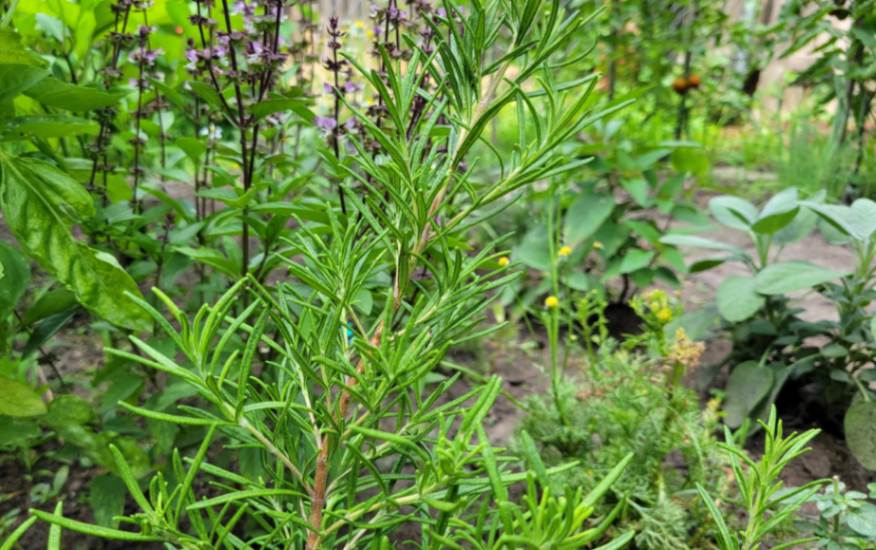
Frequently Asked Questions (FAQs)
Can I plant lavender with my rosemary?
Lavender is an excellent companion plant for rosemary as both herbs have similar growing requirements and complement each other visually in the garden.
Can I plant rosemary with other herbs in containers?
Rosemary can be grown alongside other herbs like thyme, sage, and parsley in containers. Just ensure that each herb has enough space for its roots to grow.
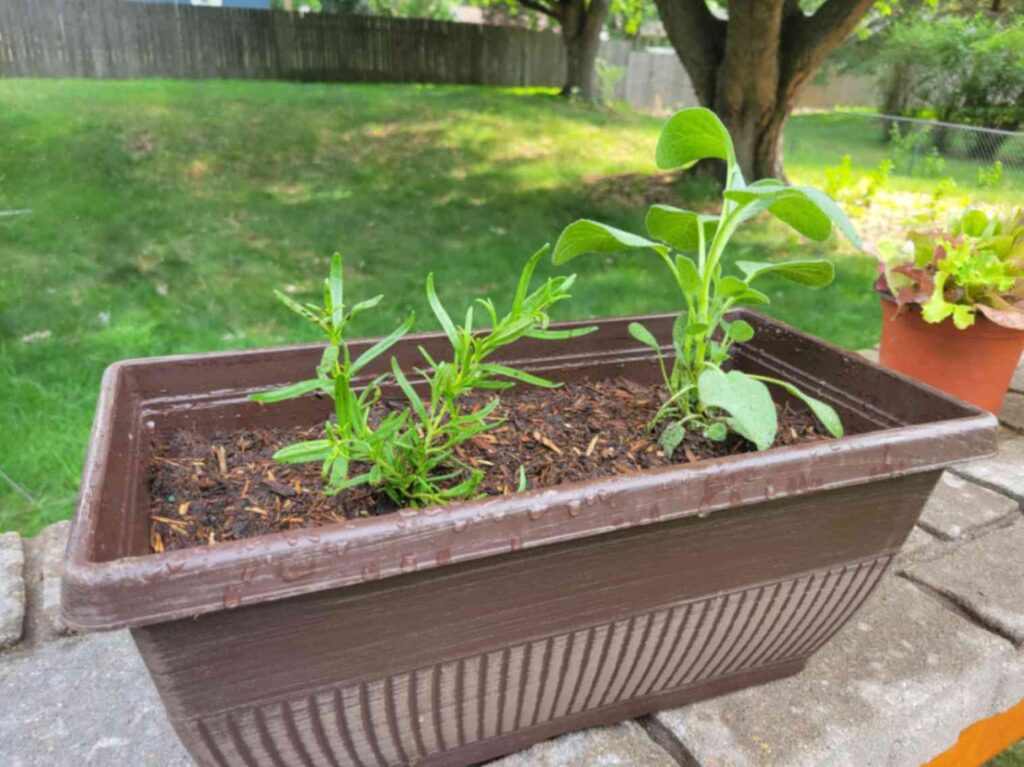
How often should I water my rosemary when practicing companion planting?
Rosemary prefers well-drained soil, so it’s important not to overwater. Water deeply once a week, allowing the soil to dry out between watering sessions.
Are there any flowers that go well with rosemary?
Marigolds and calendula make great companions for rosemary as they help deter pests, while geraniums add a pop of color to your herb garden.
How long does it take for rosemary companion planting to show results?
The benefits of companion planting may vary depending on various factors such as climate, soil conditions, and plant maturity. However, you can start observing positive effects within a few weeks to a couple of months after implementing companion planting strategies.
Last Updated on 28 April 2024 by Bob Lee

